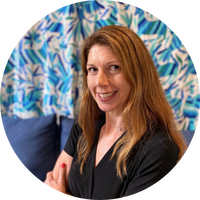Advice on Organizational Effectiveness with Jen Hartnett-Bullen
- 0.5
- 1
- 1.25
- 1.5
- 1.75
- 2
INTRODUCTION: Welcome to The Daily Bolster. Each day we welcome transformational executives to share their real world experiences and practical advice about scaling yourself, your team, and your business.
Matt Blumberg: Welcome to The Daily Bolster. I'm Matt Blumberg, co- founder and CEO of Bolster. And I'm here today with Jen Hartnett- Bullen. Jen is the Executive Director of Mendoza Impact. Jen, welcome to The Daily Bolster.
Jen Hartnett-Bullen: Hi Matt. Thank you. I'm so happy to be here with you today.
Matt Blumberg: Okay, and what's the name of your companion? For those who are on the podcast, you can't see. If you're on the YouTube channel, you can see a stuffed dog, stuffed animal dog.
Jen Hartnett-Bullen: VC puppy, and he is my partner in crime. So if you follow Mendoza Ventures, which is our partner organization, you'll be familiar with VC Puppy. He is our ambassador.
Matt Blumberg: All right. So Jen, tell everyone first, what is Mendoza Impact?
Jen Hartnett-Bullen: So Mendoza Impact is a new nonprofit that was established to fund and empower founders, funders, and fellows. And we're just getting started and getting ready to welcome our first cohorts into the Micro Community Venture program the first week of August. And we're working with that cohort on topics that are getting them ready to scale and be ready for those series A and larger investments, really focusing on organizational effectiveness and other things you need to know about.
Matt Blumberg: So organizational effectiveness is a great topic for us today. It's one that I care deeply about and have with every organization I've run. And my question for you is, if you're about to have this cohort where you're advising them on organizational effectiveness, what are the top three things you're going to advise them on?
Jen Hartnett-Bullen: Yeah, so top three is a really tough one. I think there are a lot of different considerations, but if I had five minutes, for example, with a cohort of founders, I think there's three things that would be really important to think about. The first one is to clearly define the outcomes that your organization is looking to achieve, that your business is looking to achieve. They can be qualitative, they can be quantitative, things like market share, things like revenue, things like customer satisfaction. The important thing is to have an understanding of what does good look like and how do you articulate that, knowing that that could be something that evolves over time as internal and external conditions change. The second thing I would say is inclusive leadership. And that means considering all of the right perspectives and points of view. That can mean putting different voices at the table around you, meaning different lived experiences, different expertise, different industry experience and thoughts. Just really making sure that you're listening and taking those perspectives to bear. And that will help you know whether you need adjustments to your operating model, your processes, any of your staffing. And then the third piece I would say is an optimized talent strategy. And by that I mean making sure you have the right people in the right place at the right time bringing the right skill sets to bear. And this is really important for early stage founders when it's... my joke that I use is it's two guys and a dog in a garage. And that might be great today and that might be great for a few months, but as you get more customers, as you get more traction, that's not going to be great for long. So you need to have a good understanding of how you need your talent to shift and how you will extend that talent. Maybe you bring in particular players for a specific period of time. Maybe you bring them in for the long haul knowing that you'll work with them to grow their talents as the organization and as the business and what you need from them changes and evolves. So those are the three things.
Matt Blumberg: They're three good ones. They're three important ones. I actually have always found with the third one, that sort of talent strategy, that it's not just about who you bring in, but it's about helping the people who are in the organization understand the different directions they can take their careers with you and how those line up with the organization's needs, which are going to be sort of dynamic meets dynamic.
Jen Hartnett-Bullen: Yeah, that's right. And keeping your talent engaged. So it's really critical for everybody in the company to understand how what their job is connects to the strategy. And that will keep them engaged, that will keep them involved and productive and effective in the long haul. And if you can think about how you can help individuals pivot their roles as the company scales and grows, then that will ensure that the people you bring in from day zero can see career paths for themselves as the company grows and scales.
Matt Blumberg: All right, Jen Hartnett- Bullen, thank you so much for being here today. Good luck with your first cohort.
Jen Hartnett-Bullen: Thanks so much, Matt.
DESCRIPTION
Today on The Daily Bolster, Jen Hartnett-Bullen, Executive Director of Mendoza Impact, shares her top three tips for building effective, resilient organizations in today’s business landscape. Tune in as she and Matt talk about how to define outcomes, embrace inclusive leadership, and optimize talent strategies for long-term growth.
Today's Host

Matt Blumberg
Today's Guests


